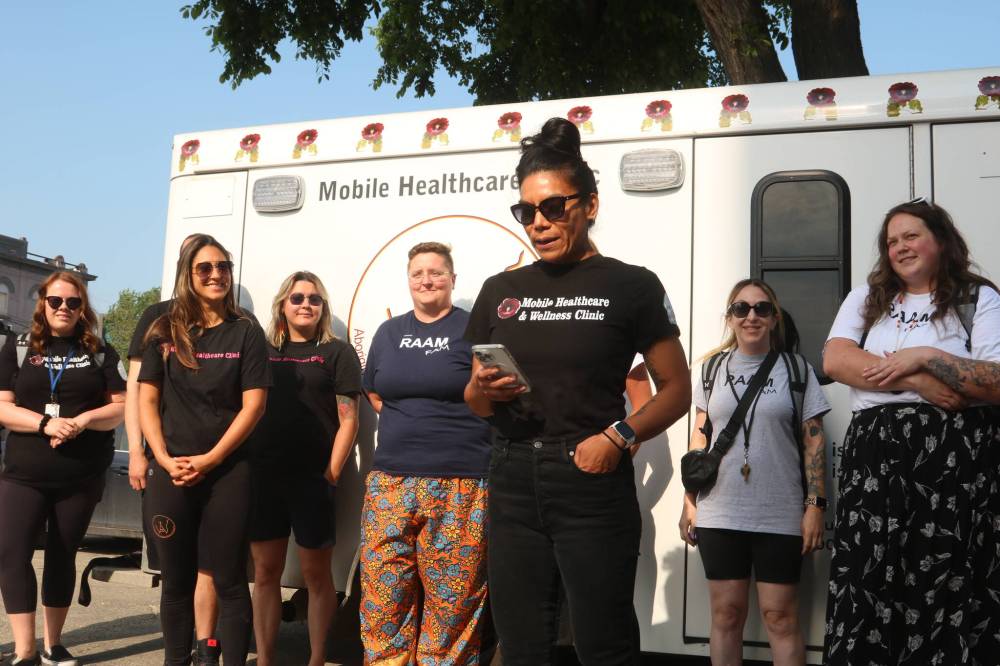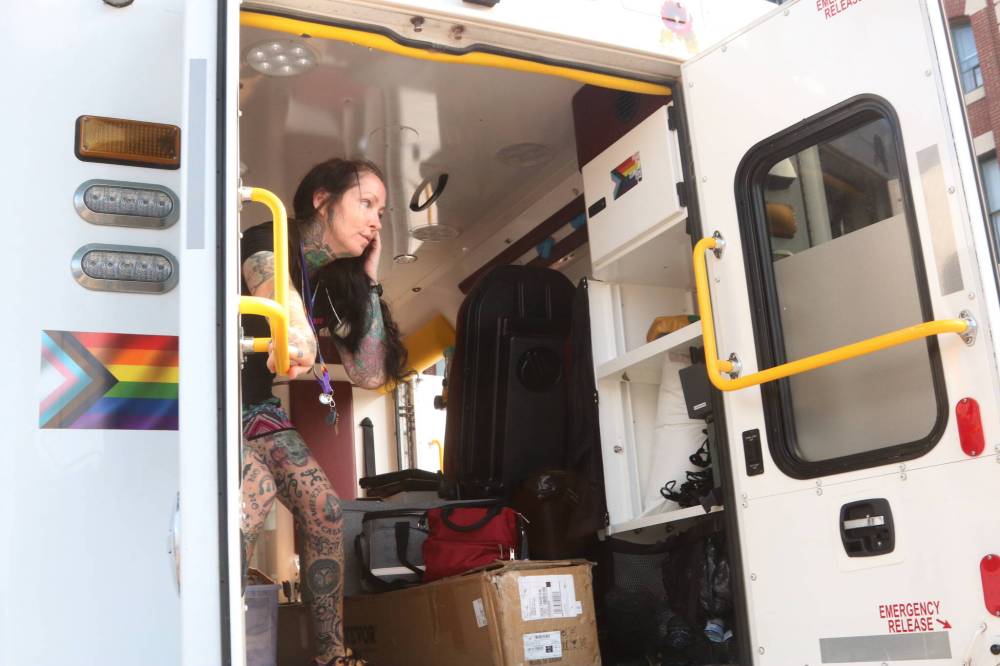Winnipeg’s first mobile health-care clinic didn’t make it out of the parking lot before it drew a crowd asking for wound care, food and mental health supports.
“I’m so beyond proud of this. We’re gonna make such a difference in so many people’s lives,” said Tasha Masesar, a nurse who works at the clinic on wheels.
Masesar spent all day Thursday in the parking lot of the Neeginan Centre doling out sandwiches, bandages, naloxone kits and sexually transmitted infection tests to a steady stream of patrons while the van’s social worker connected with homeless and marginalized people needing social services.

NICOLE BUFFIE / FREE PRESS
Laiza Pacheco, director of the Mobile Health Care and Wellness Clinic, said the hospital on wheels will revolutionize how health care is delivered to homeless and vulnerable people.
“We’re coming to them to meet their needs. We’re just open, non-judgmental: we let them tell us what they want to tell us,” Masesar said.
The retrofitted ambulance, run by the Aboriginal Health & Wellness Centre, has officially hit the road and has its eyes set on homeless encampments and the downtown core.
Funded by the province and the Winnipeg Regional Health Authority, the van – which is a one-year pilot project – will travel through Winnipeg five days per week with a nurse, physician, crisis worker and an Indigenous social planner to offer a range of services.
“There is an undeniable gap in health care services that has been plaguing our community for many years,” said Laiza Pacheco, director of the Mobile Health Care and Wellness clinic.
Pacheco hopes the clinic will revolutionize how health care is delivered to homeless and vulnerable people.
“It is our intention to see the people who are unseen,” she said.
AHWC, an Indigenous community health agency which serves urban populations, say it uses a holistic approach to health care. The agency established the model to deliver medical care to people who typically face barriers in accessing it; homeless people, those without health cards and those who say they have faced discrimination in the system.
“(We) are steadfast in our belief that individuals have the most important say in their own health care,” said Crystal Cyr, director of the Rapid Access to Addictions Medicine Clinic at AHWC.
The van will work with the Rapid Access to Addictions Medicine Clinic, stationed at 181 Higgins Avenue, on Saturdays to offer programming to people looking for help with addictions or who need withdrawal supports.
On Saturday morning the van rolled out to Main Street Project before visiting multiple encampments throughout the day.
“These people have gone unseen for so long, so it’s really good to be able to connect with them and let them know that they do matter,” Pacheco said.

NICOLE BUFFIE / FREE PRESS
Tasha Masesar, a nurse who works on mobile clinic, spent her first day doling out food, wound care and STI tests to a steady stream of patrons.
There has been tension around homeless encampments in the city in recent weeks; in late June Mayor Scott Gillingham sent a letter to multiple community organizations warning them to steer clear of police and paramedics who respond to calls to encampments.
Earlier this month Main Street Project and St. Boniface Street Links disagreed over how to deal with an encampment in Glengarry Park; Street Links outreach workers tried to offer the encampment dwellers shelter while Main Street Project staff told the campers they could stay put and didn’t have to go anywhere.
Pacheco says the clinic’s purpose is to merely meet people where they are at, and provide any supports they may ask for.
“We’re not there to tell people to move or anything like that. We’re just there to attend both health care needs, and then if people want to talk about wanting to move, then we’ve got workers that can help them,” she said.
Health Minister Uzoma Asagwara called the van’s mission “life-saving work.”
“We’re really lucky to have really incredible partners … who are willing to step up and meet the needs of folks in community,” the minister said. “As a government anytime that we can get behind those kinds of efforts and work together to make health care better and make health better in our communities, that’s what we should be doing.”
nicole.buffie@freepress.mb.ca

Nicole Buffie
Multimedia producer
Nicole Buffie is a multimedia producer who reports for the Free Press city desk. Born and bred in Winnipeg, Nicole graduated from Red River College’s Creative Communications program in 2020 and worked as a reporter throughout Manitoba before joining the Free Press newsroom in 2023. Read more about Nicole.
Every piece of reporting Nicole produces is reviewed by an editing team before it is posted online or published in print — part of the Free Press‘s tradition, since 1872, of producing reliable independent journalism. Read more about Free Press’s history and mandate, and learn how our newsroom operates.
Our newsroom depends on a growing audience of readers to power our journalism. If you are not a paid reader, please consider becoming a subscriber.
Our newsroom depends on its audience of readers to power our journalism. Thank you for your support.